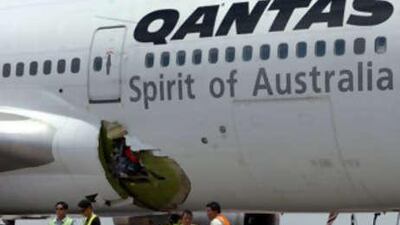Metal fragments from an oxygen cylinder have been recovered from a Qantas jumbo jet after a mid-air explosion forced it to make an emergency landing in Manila, an Australian investigator said today. The Qantas Boeing 747-400, which made the emergency landing after its fuselage was ripped open by the explosion, remains grounded in a hangar at Manila's international airport. Investigators combing the plane for clues were focusing on the possible explosion of an emergency oxygen cylinder, said Neville Blyth, lead investigator from the Australian Transport Safety Bureau (ATSB).
Mr Blyth said the fourth cylinder - in a row of six oxygen tanks from the forward cargo hold - was missing. "There has been a number of small parts recovered from inside the aircraft cabin, including part of the oxygen cylinder valve," Mr Blyth told reporters in Manila. He declined to comment on whether those parts indicated that the cylinder had disintegrated or exploded, but he acknowledged the fragments went through the cabin floor and created a 20-centimetre hole above the cylinder's location.
Asked whether it was possible the cylinder itself had been blown out of the aircraft, creating the hole in the fuselage, he said: "That is possible, yes." Mr Blyth said the recovered parts would undergo a forensic engineering examination at the ATSB's laboratories in Canberra. He said the investigation in Manila will likely end in the next two days, depending on the clues gathered so far from the 17-year-old plane. An initial report is to be issued by the ATSB within a month.
They were "investigating the aircraft and documenting the damage in a slow and methodical way. These things take time, it is important not to rush," he said. The flight data recorder and the cockpit voice recorder also have been recovered and were to be analysed in Australia, he said. "That download and analysis of the recorded data would be carried out in the next few days," he added. The Qantas Boeing 747 was flying from Hong Kong to Melbourne when an explosion led to a sudden loss of air pressure in the cabin.
The plane, which had originated in London and was carrying 365 passengers and crew, plunged 6,000 metres before stabilising, then made an emergency landing in Manila. David Cox, chief engineer for Qantas, said an explosion caused by an oxygen bottle has never happened before on a passenger airline. There have been press reports quoting some passengers as saying the oxygen masks failed to deployed, which Qantas was investigating, Mr Blyth said.
He said all passengers would be asked to recount their experiences, and are being urged to help in the investigation by submitting any photographs or videos taken in flight. "The maintenance records are being examined at the moment," Mr Blyth said, stressing it was for air worthiness. Officials were also going to determine whether an advisory to check oxygen cylinders for carriers with similar aeroplanes would be issued. Mr Cox refused to speculate on whether an exploding oxygen bottle was to blame for rupturing the plane's hull in an incident that Qantas executives acknowledged ended in a lucky escape for passengers. Australian air safety officials confirmed that if an exploding oxygen bottle is proved to have blown a hole in the jet, it would mark the first time such an incident has been recorded in a large passenger plane. "Not to my knowledge," Mr Blyth replied when asked if there were similar incidents in the past involving passenger carriers. *AFP

